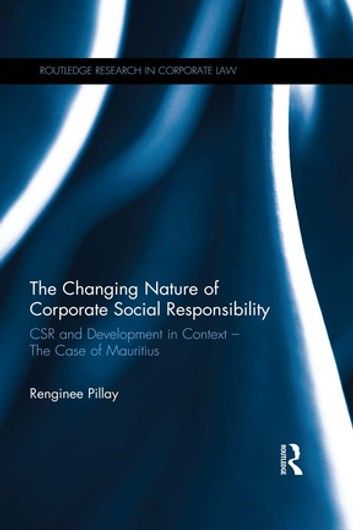| FindBook |
有 1 項符合
The Changing Nature of Corporate Social Responsibility的圖書 |
 |
The Changing Nature of Corporate Social Responsibility 作者:Renginee Pillay 出版社:Taylor & Francis 出版日期:2015-02-20 語言:英文 |
| 圖書館借閱 |
| 國家圖書館 | 全國圖書書目資訊網 | 國立公共資訊圖書館 | 電子書服務平台 | MetaCat 跨館整合查詢 |
| 臺北市立圖書館 | 新北市立圖書館 | 基隆市公共圖書館 | 桃園市立圖書館 | 新竹縣公共圖書館 |
| 苗栗縣立圖書館 | 臺中市立圖書館 | 彰化縣公共圖書館 | 南投縣文化局 | 雲林縣公共圖書館 |
| 嘉義縣圖書館 | 臺南市立圖書館 | 高雄市立圖書館 | 屏東縣公共圖書館 | 宜蘭縣公共圖書館 |
| 花蓮縣文化局 | 臺東縣文化處 |
|
|
Corporate Social Responsibility (CSR) has increasingly been promoted as an important mechanism for furthering economic and social development goals in developing countries. In such an optimistic climate, questions arise as to whether CSR can bear the weight of the increasing expectations being heaped on its shoulders. This book examines the changing nature of corporate social responsibility as it has been conceived over the past eighty years. It considers the historical and socio-legal developments of the idea of CSR and the various conceptions of the corporation which underlie different realisations of CSR.
The book explores the model of CSR deployed in the developing world as well as the links between CSR and development. Renginee Pillay uses Mauritius as a case-study, demonstrating how CSR and corporate governance issues have come to the fore of political, financial and legal landscapes. Drawing on empirical research, the book examines how the first legislation of its kind has been implemented in Mauritius, and analyses its impact on development.
In its work to evaluate the contribution CSR can make to development, this book will be of great use and interest to students and researchers of business and company law, business ethics, and development studies.
|











